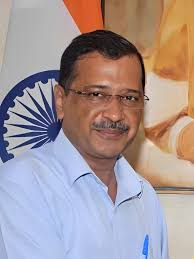
Table of Contents
In a dramatic development in the ongoing legal saga involving Delhi Chief Minister Arvind Kejriwal, the Delhi High Court (HC) has issued a pointed question to the Enforcement Directorate (ED) regarding a plea to cancel Kejriwal’s bail. The question, “Will you arrest Kejriwal again?” has added a new layer of intrigue and tension to a case that has already been marked by legal complexities and high political stakes.
Background of the Case
Arvind Kejriwal, the Chief Minister of Delhi and a prominent leader of the Aam Aadmi Party (AAP), has faced legal challenges that have captured widespread attention. The case involves allegations of corruption and misconduct linked to his tenure as a public servant. These allegations have led to an ongoing investigation by the Enforcement Directorate, a key agency responsible for tackling financial crimes and corruption.
Charges and Investigation: The specific charges against Kejriwal relate to allegations of financial irregularities and corruption in various government schemes and contracts. The ED’s investigation has been a focal point of political discourse, with Kejriwal and his party arguing that the charges are politically motivated.
Initial Legal Proceedings: In the earlier stages of the case, Kejriwal was granted bail, which allowed him to continue his duties as Chief Minister while the investigation proceeded. The bail conditions typically include provisions that limit the individual’s freedom in certain respects while the legal process unfolds.
The High Court’s Intervention
The recent intervention by the Delhi High Court has brought the case back into the limelight. The court’s question, “Will you arrest Kejriwal again?”
Plea for Bail Cancellation: The ED’s plea for bail cancellation argues that there are grounds to revoke the bail granted to Kejriwal. The agency’s request may be based on various factors, including new evidence, perceived non-compliance with bail conditions, or concerns about the impact of Kejriwal’s continued presence on the investigation.
Court’s Query: The High Court’s question reflects a critical examination of the ED’s request. The query underscores the court’s role in scrutinizing the basis for such a significant legal action as the cancellation of bail. By asking if Kejriwal would be arrested again, the court is highlighting the potential implications of the ED’s plea and probing the rationale behind it.
Implications of the Court’s Question
The High Court’s question raises several important considerations:
- Legal Implications: The potential re-arrest of Kejriwal would have significant legal implications. It would impact the ongoing investigation and could affect the political landscape. The court’s inquiry indicates a need for a thorough examination of the reasons for seeking bail cancellation.
- Political Ramifications: The arrest or re-arrest of a sitting Chief Minister has profound political ramifications. It would not only affect Kejriwal’s role in Delhi’s governance but also influence public perception and the broader political climate. The question highlights the intersection of legal and political considerations in the case.
- Impact on the Investigation: If Kejriwal’s bail were to be canceled, it could impact the investigation process. The ED’s actions would need to be justified in a manner that aligns with legal standards and ensures that the investigation is conducted fairly and without bias.
Response from the ED and Kejriwal’s Team
In response to the High Court’s question and the plea for bail cancellation, both the ED and Kejriwal’s legal team have made their positions known:
ED’s Position: The Enforcement Directorate may argue that the circumstances warrant bail cancellation based on new evidence or non-compliance with bail conditions. The agency’s argument would need to be substantiated with clear legal justifications and evidence to persuade the court.
Kejriwal’s Defense: Kejriwal’s legal team is likely to counter the plea by emphasizing the legitimacy of his bail and the absence of grounds for its cancellation. They may argue that the bail conditions have been adhered to and that the charges are politically motivated.
Legal Framework and Considerations
In addressing the plea for bail cancellation, the court will consider several legal factors:
- Grounds for Bail Cancellation: Bail can be canceled if there is evidence of serious non-compliance with conditions or if new evidence suggests that the individual poses a risk of obstructing justice. The court will examine whether the ED’s plea meets these criteria.
- Rights of the Accused: The rights of the accused, including the presumption of innocence and the right to fair treatment, will be a central consideration. Any decision to cancel bail must be balanced against these fundamental rights.
- Impact on Governance: As Kejriwal is a sitting Chief Minister, the court will also consider the implications of his potential re-arrest on the governance of Delhi. The legal process must account for the operational aspects of government and the potential disruption caused by such a decision.
Broader Context
The case against Arvind Kejriwal is part of a broader trend of legal and political challenges faced by prominent public figures. High-profile cases often involve a complex interplay of legal procedures, political interests, and public opinion. The Delhi High Court’s involvement reflects the judiciary’s role in navigating these complexities and ensuring that justice is served in accordance with legal standards.
Conclusion
The Delhi High Court’s question, “Will you arrest Kejriwal again?” underscores the gravity of the situation surrounding Delhi Chief Minister Arvind Kejriwal’s legal troubles. The query highlights the court’s need to scrutinize the Enforcement Directorate’s plea for bail cancellation and the implications of such a decision. As the case progresses, the legal arguments and evidence presented by both the ED and Kejriwal’s defense will be critical in determining the outcome. The situation remains fluid, with potential impacts on the political landscape, the ongoing investigation, and the functioning of Delhi’s government. The court’s decision will be pivotal in shaping the next steps in this high-stakes legal drama.









